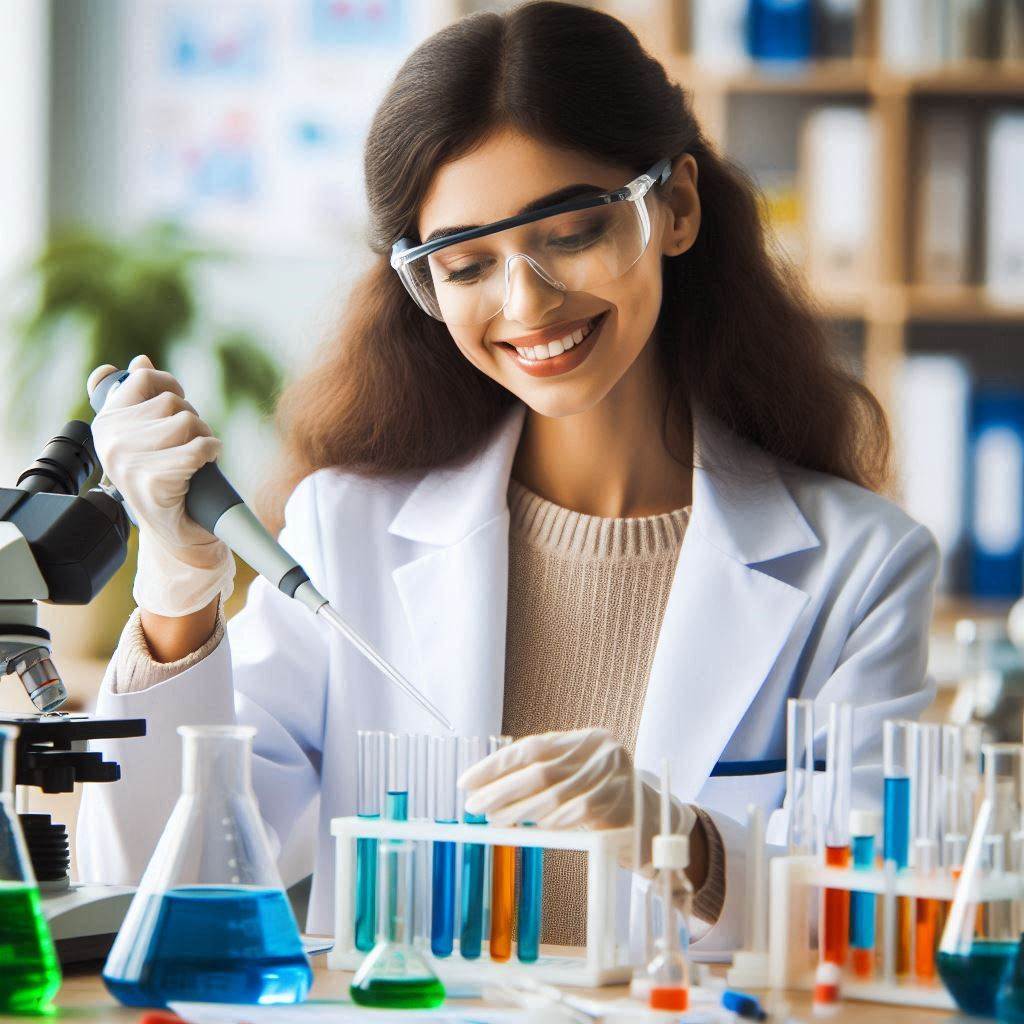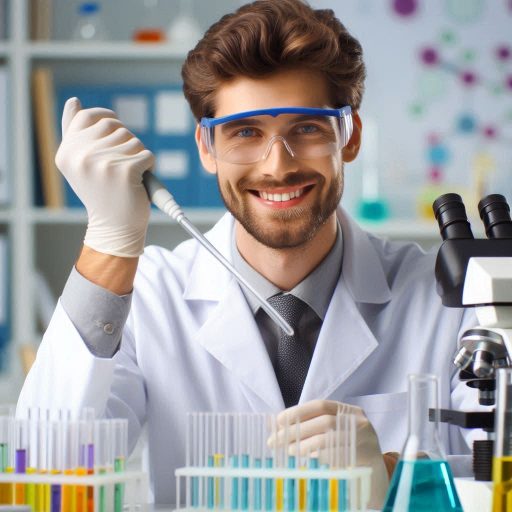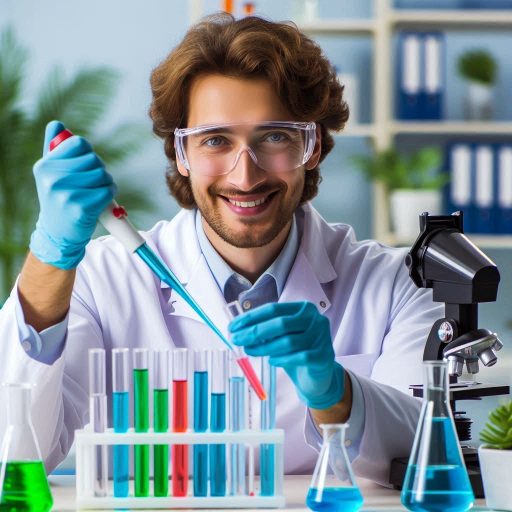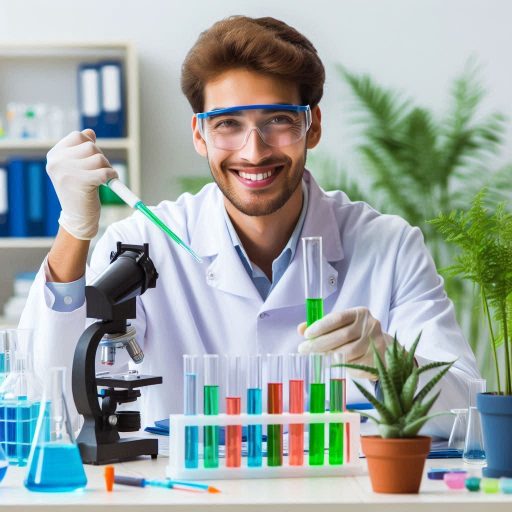Introduction
Overview of the Role of Lab Technicians
Lab technicians play a crucial role in laboratories by performing essential tasks.
They prepare and analyze samples, ensuring accurate test results.
Their duties include operating and maintaining laboratory equipment, following safety protocols, and recording data.
Lab technicians must adhere to strict procedures and ensure precision in their work.
They troubleshoot equipment issues and perform routine maintenance to keep operations running smoothly.
Their technical skills and attention to detail are vital for obtaining reliable results.
Importance of Lab Technicians in Various Industries
Lab technicians are vital across various industries.
In healthcare, they provide critical support for accurate diagnoses and effective treatment plans.
Their work ensures the reliability of test results, impacting patient care.
In research, lab technicians contribute to scientific advancements by managing experiments and analyzing data.
Their role is crucial in developing new technologies and treatments.
The expertise and diligence of lab technicians are essential for the success and progress of both healthcare and research, underscoring their importance in modern science and medicine.
Educational Requirements for Lab Technicians
Lab technicians play a crucial role in scientific and medical fields.
To become a lab technician, specific educational qualifications are necessary.
Here’s a breakdown of the key educational requirements.
High School Diploma or Equivalent
A high school diploma or equivalent is the basic requirement for aspiring lab technicians.
This foundational education provides essential skills in math, science, and communication.
High school courses in biology, chemistry, and algebra are particularly beneficial.
These subjects offer a strong foundation for more advanced studies in laboratory science.
Many employers require this minimum educational level to ensure a basic understanding of scientific concepts and laboratory procedures.
Associate’s Degree or Certification in Laboratory Science
An associate’s degree or certification in laboratory science is highly recommended for those seeking a lab technician role.
This post-secondary education typically involves a two-year program at a community college or technical school.
The curriculum includes hands-on training in laboratory techniques, equipment usage, and safety protocols.
Courses often cover subjects like microbiology, clinical chemistry, and hematology.
Achieving an associate’s degree or certification demonstrates specialized knowledge and skills in the field.
This educational level significantly enhances employability and prepares technicians for more complex tasks in the lab.
Continuing Education and Training
Continuing education and training are essential for lab technicians to stay current with advancements in the field.
Technology and techniques in laboratory science evolve rapidly.
Regular training helps technicians maintain up-to-date skills and knowledge.
Continuing education may include workshops, seminars, or online courses.
Many professional organizations offer certifications and courses to enhance skills and career growth.
Staying current with industry trends and new technologies ensures that lab technicians can perform their duties effectively and safely.
Employers often value technicians who invest in ongoing professional development.
In summary, becoming a lab technician requires a combination of basic and specialized education.
Starting with a high school diploma lays the groundwork.
Pursuing an associate’s degree or certification provides more advanced knowledge and skills.
Finally, engaging in continuing education helps technicians remain proficient and adaptable in a rapidly evolving field.
Each educational step builds on the previous one, preparing technicians for a successful career in laboratory science.
Performing Laboratory Tests and Experiments
Lab technicians are responsible for conducting various tests and experiments.
Their work ensures accurate data and reliable results.
Here’s a look at the key aspects of performing laboratory tests and experiments.
Following Standard Operating Procedures
Adhering to standard operating procedures (SOPs) is crucial for lab technicians.
SOPs provide detailed instructions for performing tests and experiments.
They ensure consistency and accuracy in lab operations.
Technicians must follow these procedures precisely to maintain the integrity of results.
Deviating from SOPs can lead to errors or unreliable data.
Following SOPs also helps in maintaining safety standards and proper handling of materials.
Utilizing Various Lab Equipment and Technology
Lab technicians use a range of equipment and technology in their work.
This includes microscopes, centrifuges, pipettes, and analytical instruments.
Proper use of this equipment is essential for accurate test results.
Technicians must be trained in operating and calibrating these devices.
Familiarity with technology such as computer software for data analysis is also important.
Effective use of lab equipment and technology helps in obtaining precise measurements and conducting experiments efficiently.
Ensuring Accurate and Reliable Results
Ensuring accuracy and reliability is a core responsibility of lab technicians.
This involves careful preparation and execution of tests.
Technicians must double-check measurements and calibrate equipment regularly.
Proper documentation of procedures and results is essential for verifying findings.
If results are inconsistent, technicians must troubleshoot and correct any issues.
Accuracy in lab work is vital for producing valid data that can support research and diagnostics.
Reliable results contribute to the overall success and credibility of scientific studies.
In summary, performing laboratory tests and experiments involves strict adherence to SOPs, effective use of lab equipment and technology, and a focus on accuracy.
Each step in this process is essential for ensuring the validity and reliability of laboratory findings.
Lab technicians play a critical role in generating data that drives scientific advancements and supports various fields of research and healthcare.
Read: Impact of Drones on Surveying and Mapping
Maintaining Laboratory Cleanliness and Organization
Maintaining a clean and organized laboratory is essential for effective and safe operations.
Lab technicians are responsible for several key tasks to ensure a hygienic and orderly environment.
Cleaning and Sanitizing Workspaces and Equipment
Regular cleaning and sanitizing of workspaces and equipment are crucial for preventing contamination.
Technicians must follow strict protocols for cleaning surfaces, tools, and instruments.
This includes wiping down countertops and sterilizing equipment between uses.
Proper cleaning helps maintain the integrity of experiments and prevents cross-contamination.
Technicians should use appropriate cleaning agents and follow manufacturer instructions for sanitization.
Maintaining cleanliness is vital for ensuring accurate results and a safe working environment.
Proper Disposal of Hazardous Materials
Proper disposal of hazardous materials is essential for laboratory safety.
Technicians must follow established protocols for handling and disposing of chemicals, biological waste, and other hazardous substances.
This includes using designated containers and labeling them correctly.
Hazardous waste must be disposed of according to regulatory guidelines to prevent environmental contamination and health risks.
Technicians should be trained in proper disposal procedures and stay updated on local regulations to ensure compliance.
Inventory Management and Restocking Supplies
Effective inventory management and restocking of supplies are critical for smooth lab operations.
Technicians must regularly check stock levels of reagents, chemicals, and other materials.
Keeping accurate records helps prevent shortages and ensures that necessary supplies are always available.
Restocking supplies in a timely manner helps avoid interruptions in laboratory work.
Technicians should also ensure that all supplies are stored properly to maintain their effectiveness and safety.
In summary, maintaining laboratory cleanliness and organization involves diligent cleaning and sanitizing, proper disposal of hazardous materials, and effective inventory management.
These practices are essential for ensuring a safe, efficient, and productive laboratory environment.
Lab technicians play a vital role in upholding these standards to support accurate research and effective operations.
Read: Top Surveying and Mapping Technician Employers
Recording and Analyzing Data
Accurate data recording and analysis are essential for the success of laboratory work.
Lab technicians must handle data meticulously to ensure reliable results and effective communication.
Here’s how they manage these tasks:
Documenting Test Results and Observations
Documenting test results and observations is a fundamental responsibility for lab technicians.
Every test conducted and every observation made must be recorded precisely.
This documentation includes noting down numerical results, qualitative observations, and any deviations from expected outcomes.
Clear and accurate records provide a basis for future analysis and verification.
Proper documentation ensures that all data is traceable and can be reviewed or audited if necessary.
Technicians should use standardized forms and digital systems for consistency and accuracy.
Analyzing Data for Trends and Abnormalities
Analyzing data involves examining test results to identify trends and abnormalities.
Technicians review the data to detect patterns, correlations, or unexpected results.
Statistical tools and software may be used to perform detailed analyses.
Identifying trends can help in understanding the underlying processes and making informed decisions.
Recognizing abnormalities is crucial for troubleshooting and improving experimental conditions.
Accurate data analysis supports research findings and contributes to the overall success of scientific projects.
Communicating Findings to Supervisors or Team Members
Effective communication of findings is essential for collaborative work in the laboratory.
Technicians must present their results clearly to supervisors or team members.
This includes preparing detailed reports, summaries, or presentations of their findings.
Clear communication helps in making informed decisions and planning further actions.
Technicians should be prepared to explain their data and analysis methods and address any questions or concerns.
Effective communication ensures that everyone involved is informed and aligned with the laboratory’s objectives.
In summary, recording and analyzing data involve thorough documentation, careful analysis for trends and abnormalities, and clear communication of findings.
Each of these tasks is crucial for ensuring that laboratory results are accurate, meaningful, and useful for ongoing research and decision-making.
Lab technicians play a key role in managing data to support scientific advancements and operational efficiency.
Transform Your Career Today
Unlock a personalized career strategy that drives real results. Get tailored advice and a roadmap designed just for you.
Start NowRead: Safety Tips for Field Surveying Technicians

Collaborating with Other Healthcare Professionals
Lab technicians often work closely with other healthcare professionals to support patient care and research.
Their collaboration is vital for achieving accurate results and advancing medical science.
Here’s how they contribute to these efforts:
Assisting Physicians and Researchers in Clinical Trials
Lab technicians play a crucial role in clinical trials by assisting physicians and researchers.
They help with collecting samples, preparing specimens, and conducting tests as per trial protocols.
Technicians ensure that all procedures are followed accurately to maintain the integrity of the trial.
Their expertise in handling and analyzing samples contributes to the reliability of trial results.
Effective collaboration helps in generating valid data that supports new treatments and medical advancements.
Sharing Information with Colleagues for Research Purposes
Sharing information with colleagues is essential for research purposes.
Lab technicians provide data, observations, and insights to support ongoing studies and projects.
They collaborate with researchers and other lab professionals to interpret results and refine methodologies.
Effective communication and data sharing facilitate collective problem-solving and innovation.
Technicians must ensure that information is shared accurately and securely, maintaining confidentiality and adhering to ethical guidelines.
Participating in Interdisciplinary Teams for Patient Care
Lab technicians often participate in interdisciplinary teams to enhance patient care.
They collaborate with doctors, nurses, and other healthcare providers to discuss test results and treatment options.
Their input helps in diagnosing conditions, monitoring patient progress, and adjusting treatment plans.
Working in interdisciplinary teams ensures a comprehensive approach to patient care, integrating lab results with clinical observations and patient history.
Technicians contribute valuable information that supports well-rounded and effective patient management.
In summary, collaborating with other healthcare professionals involves assisting in clinical trials, sharing research information, and participating in interdisciplinary teams.
Lab technicians play a vital role in these collaborations, ensuring accurate data handling and contributing to patient care and medical research.
Their teamwork and communication skills are essential for advancing healthcare and improving patient outcomes.
Read: Recent Trends in Surveying and Mapping Technologies
Adhering to Safety Protocols and Regulations
Safety is a top priority in laboratory environments.
Lab technicians must adhere to strict safety protocols and regulations to ensure a safe and efficient workplace.
Here’s a breakdown of their key responsibilities:
Following Strict Safety Guidelines to Prevent Accidents or Contamination
Lab technicians must follow strict safety guidelines to prevent accidents and contamination.
This includes wearing personal protective equipment (PPE) such as gloves, goggles, and lab coats.
They must adhere to protocols for handling and storing chemicals and biological materials safely.
Technicians should be familiar with emergency procedures, such as spill response and first aid.
By following these guidelines, they help minimize risks and maintain a clean, safe laboratory environment.
Consistent adherence to safety protocols protects both technicians and the integrity of their work.
Proper Handling and Disposal of Biological Samples and Chemicals
Proper handling and disposal of biological samples and chemicals are crucial for safety and regulatory compliance.
Technicians must follow procedures for safely handling and storing hazardous materials.
This includes using appropriate containers and labels for chemicals and biological samples.
Disposal must be done according to environmental and safety regulations to prevent contamination and environmental harm.
Technicians should be trained in proper disposal techniques and be aware of local regulations.
Effective management of hazardous materials ensures a safe working environment and compliance with legal requirements.
Reporting Any Safety Concerns to Management
Reporting safety concerns to management is a critical responsibility for lab technicians.
They must promptly notify supervisors about any potential hazards or safety issues, such as equipment malfunctions or unsafe conditions.
Timely reporting allows for quick resolution of problems and prevents accidents or contamination.
Technicians should also participate in safety meetings and training sessions to stay informed about safety practices.
By proactively addressing safety concerns, technicians contribute to a culture of safety and help maintain a secure laboratory environment.
In summary, adhering to safety protocols and regulations involves following strict guidelines, properly handling and disposing of materials, and reporting safety concerns.
These practices are essential for ensuring a safe and effective laboratory environment.
Lab technicians play a key role in maintaining safety standards, protecting themselves, their colleagues, and the quality of their work.
Providing Excellent Patient Care
Providing excellent patient care is a crucial aspect of a lab technician’s role.
This involves not only technical proficiency but also a compassionate approach to interacting with patients.
Here’s how lab technicians ensure high-quality patient care:
Collecting Samples from Patients with Professionalism and Compassion
Lab technicians are responsible for collecting samples from patients, such as blood or urine, with professionalism and compassion.
They must perform procedures efficiently while ensuring patient comfort and minimizing discomfort.
Building rapport and explaining the process to patients can help alleviate anxiety.
Technicians should approach each patient with empathy and respect, addressing any concerns they may have.
This compassionate approach ensures a positive experience and accurate sample collection.
Ensuring Patient Privacy and Confidentiality
Maintaining patient privacy and confidentiality is a fundamental responsibility for lab technicians.
They must handle all patient information with strict confidentiality, following legal and ethical guidelines.
This includes safeguarding personal and medical details during sample collection, processing, and reporting.
Technicians should use secure systems for data storage and ensure that only authorized personnel access patient information.
Upholding privacy standards builds trust and complies with regulations such as HIPAA.
Communicating Test Results Accurately and Promptly to Healthcare Providers
Accurate and timely communication of test results to healthcare providers is essential for patient care.
Lab technicians must ensure that results are recorded and reported correctly.
They should communicate findings clearly and promptly, using secure channels to maintain confidentiality.
Effective communication helps healthcare providers make informed decisions about patient treatment and care.
Technicians should be prepared to provide additional information or clarification if needed, supporting the overall care process.
In summary, providing excellent patient care involves collecting samples with professionalism and compassion, ensuring privacy and confidentiality, and communicating test results accurately and promptly.
Lab technicians play a vital role in delivering high-quality care, contributing to positive patient experiences and effective healthcare outcomes.
Their dedication to these aspects enhances the overall efficiency and quality of medical services.
Opportunities for Career Advancement
Lab technicians have various avenues for career advancement, which can lead to increased responsibilities and new career opportunities.
Here’s how they can progress in their careers:
Pursuing Specialized Certifications or Training
One significant way for lab technicians to advance is by pursuing specialized certifications or additional training.
Certifications in specific areas, such as molecular diagnostics or clinical chemistry, can enhance expertise and job prospects.
Specialized training often provides deeper knowledge and skills, making technicians more competitive for advanced positions.
This professional development can open doors to roles in niche areas of laboratory science and improve career prospects.
Transitioning into Supervisory or Management Roles
Lab technicians can also advance by transitioning into supervisory or management roles.
With experience and demonstrated leadership skills, technicians can move into positions such as lab manager or supervisor.
These roles involve overseeing daily operations, managing staff, and ensuring compliance with safety and quality standards.
Transitioning into management requires strong organizational and leadership abilities.
Success in these roles can lead to further opportunities in higher-level administrative or executive positions within the healthcare or research field.
Continuing Education and Professional Development Opportunities
Continuing education and professional development are crucial for career growth.
Enrolling in advanced degree programs, attending workshops, and participating in professional organizations can keep technicians updated on industry trends and advancements.
This ongoing learning helps technicians stay competitive and expand their career options.
Many organizations offer professional development resources and support for further education.
Engaging in these opportunities can lead to enhanced skills, new certifications, and career growth.
In summary, career advancement for lab technicians involves pursuing specialized certifications or training, transitioning into supervisory or management roles, and engaging in continuing education and professional development.
These pathways can enhance skills, increase job opportunities, and lead to higher levels of responsibility and career satisfaction.
By actively pursuing these opportunities, lab technicians can achieve significant professional growth and success.
Conclusion
Key Responsibilities of Lab Technicians
Lab technicians are essential in maintaining the accuracy and efficiency of laboratory operations.
They prepare and analyze samples, ensuring that tests are conducted with precision.
Responsibilities include operating and maintaining laboratory equipment, following stringent safety protocols, and managing and recording data.
Lab technicians also perform routine checks to ensure equipment is functioning correctly and adhere to quality control measures.
Their work often involves troubleshooting issues that arise during tests or equipment malfunctions.
The Crucial Role They Play in Healthcare and Research Industries
In healthcare, lab technicians provide critical support by delivering precise test results that are vital for accurate diagnoses and treatment plans.
They play a significant role in monitoring and improving patient care.
In research, lab technicians contribute to groundbreaking discoveries by managing experiments and analyzing data, which leads to the development of new treatments and technologies.
Their meticulous work impacts both immediate patient outcomes and long-term scientific advancements.
The accuracy and reliability they bring to their roles are crucial for the success and progress of both healthcare and research.
Transform Your Career Today
Unlock a personalized career strategy that drives real results. Get tailored advice and a roadmap designed just for you.
Start Now



